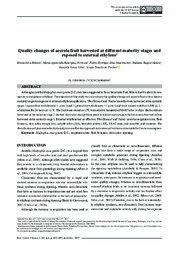Quality changes of acerola fruit harvested at different maturity stages and exposed to external ethylene.
Quality changes of acerola fruit harvested at different maturity stages and exposed to external ethylene.
Autoria: RIBEIRO, B. S.; FERREIRA, M. A. R.; NASCIMENTO, P. H. D.; MOURA, N. R.; SILVA, D. S.; FREITAS, S. T. de
Resumo: Although acerola (Malpighia emarginata D.C.) has been suggested to be a climacteric fruit, little is known about its sensitivity to exogenous ethylene. The objective of the study was to evaluate the quality changes of acerola fruit at two harvest maturity stages in response to external ethylene application. ?Flor Branca? and Junko acerolas were harvested at the maturity stages 1 (green fruit with density>1 g cm-3) and 2 (green fruit with density <1 g cm-3) and were treated with 0 or 1,000 ?L L-1 of ethylene for 24 hours at 12 ºC.The fruit were stored at 12ºC with relative humidity of 90-95% for 14 days. Both cultivars harvested at the maturity stage 2 showed skin color change from green to red during storage, which was not observed in fruit harvested at the maturity stage 1. External ethylene had no effect on Flor Branca and Junko acerolas respiration rate, flesh firmness, skin color, weight loss, soluble solids (SS), titratable acidity (AT), SS/AT ratio, and ascorbic acid contents. The classification of green acerolas by density was an effective approach to determine fruit harvest maturity for fresh consumption.
Ano de publicação: 2022
Tipo de publicação: Artigo de periódico
Unidade: Embrapa Semiárido
Palavras-chave: Acerola, Amadurecimento, Armazenamento, Consumo in natura, Cor da pele, Etileno, Firmeza da carne, Malpighia emarginata, Taxa de respiração
Observações
1 - Por padrão são exibidas publicações dos últimos 20 anos. Para encontrar publicações mais antigas, configure o filtro ano de publicação, colocando o ano a partir do qual você deseja encontrar publicações. O filtro está na coluna da esquerda na busca acima.
2 - Para ler algumas publicações da Embrapa (apenas as que estão em formato ePub), é necessário ter, no celular ou computador, um desses softwares gratuitos. Sistemas Android: Google Play Livros; IOS: iBooks; Windows e Linux: software Calibre.
Acesse outras publicações
Acesse a Base de Dados da Pesquisa Agropecuária (BDPA) para consultar o acervo completo das bibliotecas da Embrapa.

